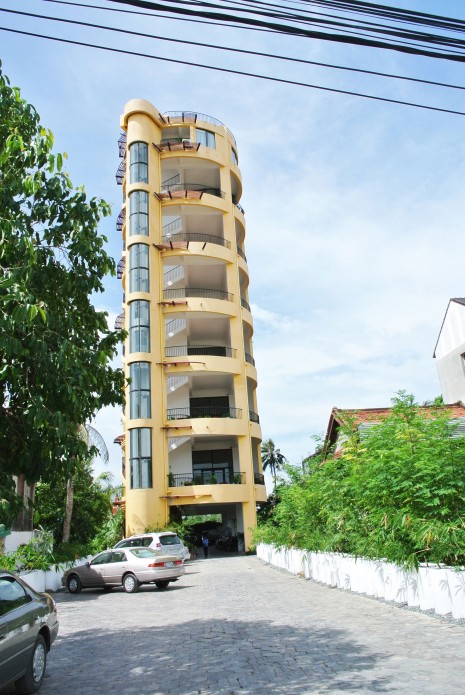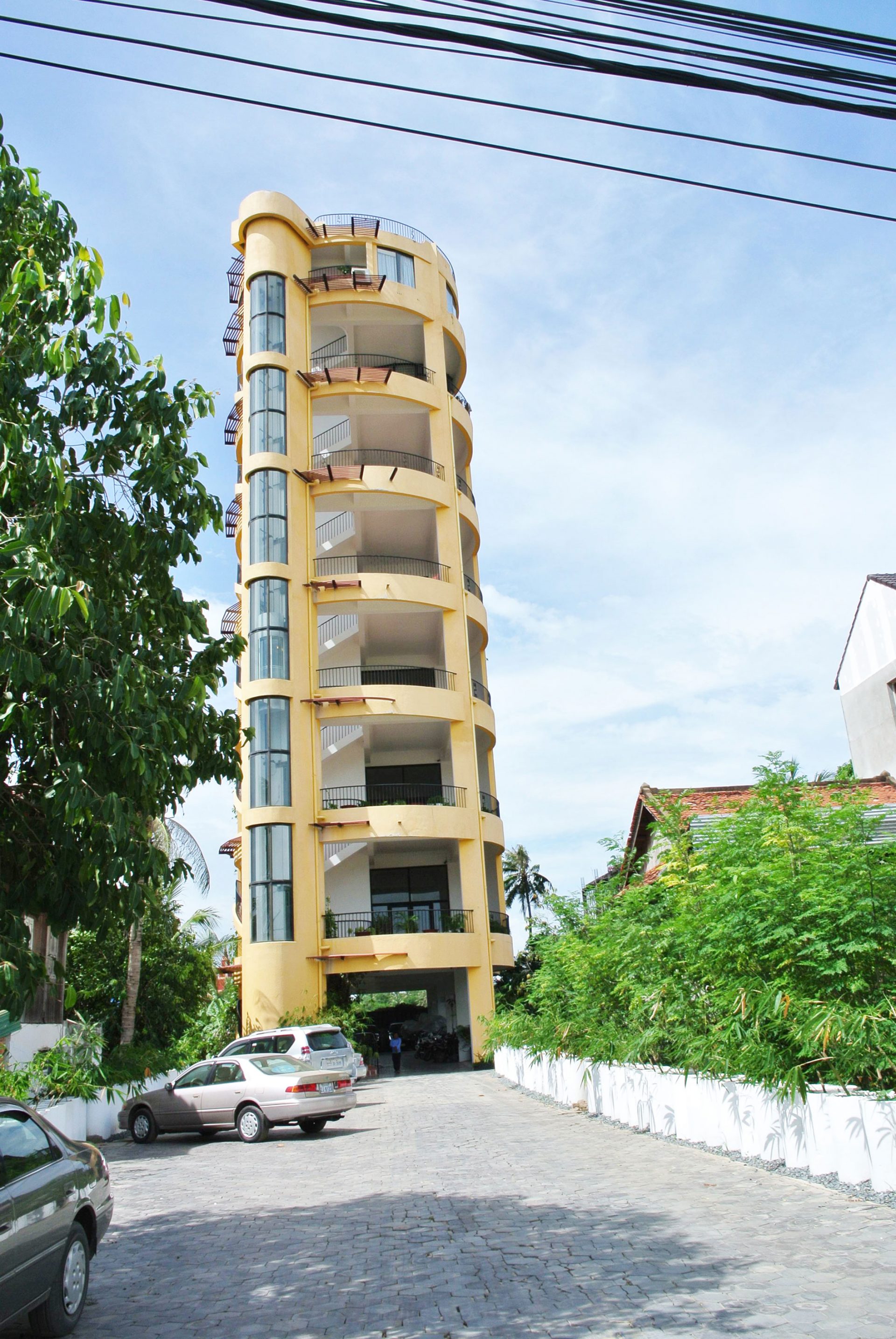In 2010, the Ha Tien Vegas Entertainment Resort, a casino investment on Kampot province’s border with Vietnam that included luxury karaoke rooms and suites, launched with high hopes of attracting Vietnamese gamblers. At the end of December, Ha Tien Vegas closed down.
To the north, in Savannakhet on the Lao border with Thailand, another casino, the Savan Vegas Hotel and Entertainment Complex, is doing better business.

Following the prevailing winds in the gaming industry, two U.S. gambling magnates with business interests in Phnom Penh have been linked to both casinos through online, virtual gambling.
Via video link-up, online gamers, playing in English, Thai or Mandarin, can gamble on live tables with Lao and foreign croupiers at the Savan Vegas casino.
The casino experience is brought remotely to the player’s computer screen, as casino staff in Laos, mostly young women, play the role of croupiers in real life games of blackjack, baccarat or roulette.
Cash to gamble in the games can be deposited directly into bank accounts held by the website operators—including one of their accounts at Cambodia’s largest bank, Acleda—or online through payment services Moneybookers or Neteller.
A similar online gaming service was offered at the Ha Tien Vegas casino when it was in operation at the website htv999.com. Though that casino is shuttered, the htv999.com website is now rerouted to the live tables at the Laos casino, which is also accessed through the websites clubvegas999.com and savanvegas999.com.
The Savan Vegas casino is operated by Macau-based Sanum Investments, but the company that offers the online gaming experience is Creative Entertainment Ltd., which has an office on Phnom Penh’s Chroy Changva peninsula, and provides access to virtual casinos through the domains clubvegas999.com and savanvegas999.com.
Their websites display a license issued in the Dutch dependency of Curacao, a small island in the Caribbean that offers licenses to online gaming operations.
Creative Entertainment, which occupies three spacious floors of the prominent Yellow Tower on Chroy Changva, advertises jobs on local recruitment websites, including for Thai-speaking telemarketers and online cashiers, working round-the-clock shifts.
Regulators worldwide are coming to terms with the highly profitable world of online gambling, which operates across jurisdictions and poses questions over licensing, taxation and enforcement of local laws—including laws in Cambodia.
For its part, Cambodia is yet to pass any regulations on online gaming.
Officials at the small department within the Finance Ministry that deals with casino licensing said they were unable to say whether it was legal or not.
In the U.S., the legality of the business remains unclear. The Justice Department has declared online gaming illegal, but some states have passed laws allowing some forms of online gambling. There, the operators of physical casinos have lobbied strongly to outlaw the online threat to their business.
In the past, Cambodian authorities have quickly shut down online gambling operations. Most recently, 114 Indonesians were deported in September, 2012, after authorities found they were running what police called an “illegal” football betting website from a villa in Phnom Penh’s Chamkar Mon district.
It is unclear whether Creative Entertainment’s license in Curacao is enough to satisfy authorities in Cambodia.
An undated record currently posted on the Commerce Ministry’s website lists U.S. citizen Shawn Scott as the director who officially established Creative Entertainment Ltd. Articles in the Washington Post in 2004 claimed that Mr. Scott and his partner, John Baldwin, were linked to a drive to legalize slot machine gambling in Washington, D.C., and had been involved in a number of racetrack and slot machine projects in various American states.
A June, 2004, a Washington Post article said that complex financial arrangements used by Mr. Baldwin and Mr. Scott had caused them problems obtaining gaming licenses in the U.S., where gaming regulators are strict about financial transparency.
Asked about Mr. Baldwin and Mr. Scott, a spokesman for Creative Entertainment said the two had divested their interest in the company some time ago.
Mr. Baldwin and Mr. Scott are also listed on the website of investment banking firm Bridge Capital LLC as chief executive and vice chairman, respectively. Bridge Capital, which is based in Saipan, in the Commonwealth of the Northern Mariana Islands—a U.S. jurisdiction—owns interests in Guam, Hawaii and Thailand, according to its website.
Bridge Capital, Mr. Baldwin and Mr. Scott between them also own more than 98 percent of the Angkor Capital Specialized Bank on Phnom Penh’s Norodom Boulevard, according to filings with the National Bank of Cambodia.
Bridge Capital is also listed in online registrar data as the “billing contact” for the website domain names clubvegas999.com, htv999.com and savanvegas999.com, all of which provide access to the live gaming websites linked to the Laos casino, and which declare that they are run by Creative Entertainment. Creative Entertainment was until last month also listed as one of the investment “projects” on Bridge Capital’s website. However, after questions from a reporter, the website was amended to omit the link to Creative Entertainment.
According to a report in Thai newspaper the Phuket News, Mr. Baldwin leases a private island off Phuket. Mr. Baldwin is also understood to own a large penthouse apartment on Phnom Penh’s riverside.
Creative Entertainment counsel Marc Borg wrote on June 26 that a statement posted on the website of clubvegas999.com, which stated, “We are registered and licensed by the Kingdom of Cambodia for Casino operations including online,” was erroneous. He also said that Mr. Baldwin and Mr. Scott are no longer associated with Creative Entertainment.
“Unfortunately, the references on several other pages on the website to Creative Entertainment being licensed in Cambodia for online gaming were holdovers of draft website pages from quite some time ago when we were contemplating licensing in Cambodia,” Mr. Borg said.
The website has now been changed.
“While there may be some outdated filings from years ago with the government showing they [Mr. Baldwin and Mr. Scott] at one time held some positions in Creative Entertainment, they resigned those positions quite some time ago and long before Creative Entertainment had any involvement in online gaming,” Mr. Borg said, declining to say who now owned the company.
Mr. Borg also threatened legal action.
“Creative Entertainment reserves all its rights and remedies in this matter should the article to be published contain false, defamatory, or otherwise actionable statements.”
Mr. Borg’s statement was the only response forthcoming from numerous attempts to meet with the investors behind the online gaming venture.
The Savan Vegas casino in Laos—which is managed by Sanum Investments Ltd., a subsidiary of Netherlands—registered Lao Holdings N.V.—has also been in the news.
Lao Holdings N.V. launched an arbitration case at the World Bank’s International Center for Settlement of Investment Disputes (ICSID) against the Lao government over their casino operation. Lao Holdings alleged that the Lao government is allowing a local businessman to seize their assets, which include a slot machine club in Vientiane.
The president of Sanum is Jody Jordahl. (An article in the state-run Vientiane Times, however, last year named Mr. Scott as “Chairman of the Board of Directors of the Savan Vegas Hotel and Casino Company Limited. The information in the Vientiane Times article could not be independently verified.)
In August last year, Mr. Jordahl approached international media and newspapers in Cambodia alleging that $400 million of assets were at risk in Laos. ICSID opened a tribunal in London in May to decide on the Savan Vegas casino case, but such arbitration proceedings can take years to come to a conclusion.
Currently, online gaming is “the elephant in the room” in any discussion of the future of the casino industry, PriceWaterhouseCoopers (PwC) said in a 2012 report titled, “Global Gaming Outlook: the casino and online gaming market to 2015.”
“Online gaming is happening across the world, whether regional, national, and state regulators and lawmakers like it or not,” the report says.
“The fog of uncertainty that surrounds the size, scope, and often the legal basis of online gaming makes it hard to assess its current and future impacts, or to plan strategies around it.”
The PwC report found that regulation of online gaming “varies widely between countries” and different forms of gaming are also differently regulated.
“These uncertainties are partly due to the fact that much of the applicable legislation predates the Internet, so its application to online services is inevitably open to debate and challenge,” the report states.
But regulators, in Cambodia too, are learning to catch up.
Ros Phearun, deputy director of the finance industry department inside the Ministry of Economy and Finance, said the government was looking into the legality of Creative Entertainment’s business.
Online casino websites are illegal in Cambodia, Mr. Phearun said.
“I am taking action,” he said, adding that information has been sent to the Ministry of Interior.
(Additional reporting by Phorn Bopha)




